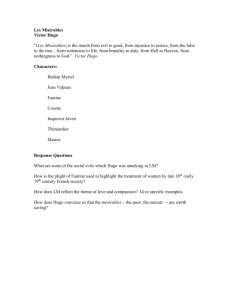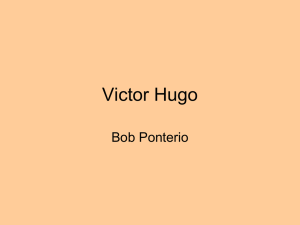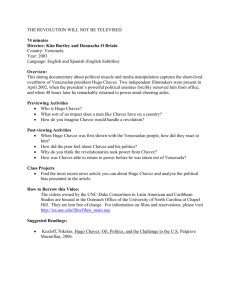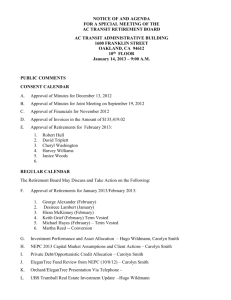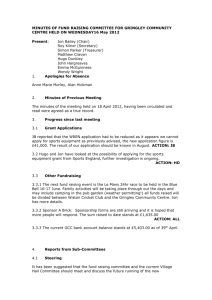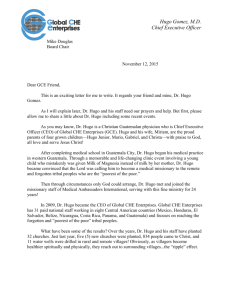File
advertisement
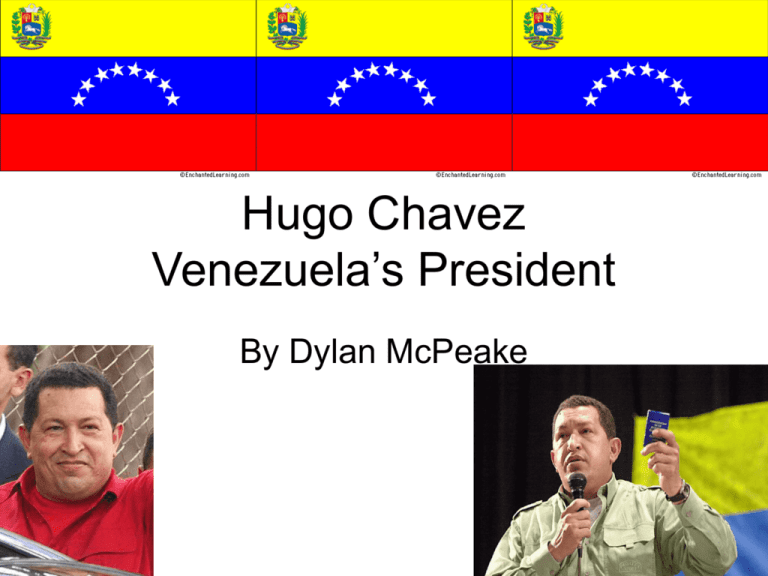
Hugo Chavez Venezuela’s President By Dylan McPeake Early Life • Hugo was born in a three room mud hut belonging to his grandmother on July 28, 1954. • He comes from a working class family. • Living conditions were horrible for Hugo growing up. His home did not have running water, indoor bathroom, a refrigerator or a fan. • He helped his family raise money by selling candy on the streets and at school. • Hugo was able to walk, read and write before entering the first grade. Early Life (continued) • Hugo enjoyed drawing, painting, history and baseball growing up. • As a child, Hugo adored a pitcher named Isais “Latigo” Chavez. Latigo died in a plane accident and Hugo went into great sadness. • Growing up, Hugo wanted to play baseball for the MLB, but changed his mind when he heard about Simon Bolivar and other great military leaders. Significant Events • Played baseball for Daniel O’Leary High School. Only talented players were chosen to play. • 1971 Hugo studied at Venezuelan Academy of Military Services. • Married a working class woman, Nancy Colmenares. – 1978 first child was born, Rosa Virginia – 1980 second child was born, Maria Gabriela – 1983 third child was born, Hugo Rafael Significant Events (continued) • 1989 Hugo was in the hospital with Chicken Pox while President Perez killed protestors during the Massacre of El Caracazo. • 1992 Hugo tried to overthrown President Perez for the first time. His mission was fighting for the rights of poor people. • 1992 Hugo surrenders to President Perez on national television. However, he was thrown in jail for two months. • 1992 For the second time, Hugo tried to overthrow President Perez for the poor peoples’ rights. This time he served a sentence of two years. Significant Events (continued) • 1997 Hugo divorced his first wife Nancy Colmenares. • He met and married Marisabel Rodriguez. Their daughter was born shortly before the marriage took place. • 1997 Hugo decides to run for the presidency of Venezuela. • 1997 Hugo becomes President of Venezuela. Significant Events (continued) • Massacre of El Sielenceo – 2002 Rich citizens protested for Chavez to resign. As a result, poor people came to his defense by jumping on motorcycles and buses to stop the protest. Accomplishments • 1975 Hugo graduated from military school as one of the best students to attend Venezuelan Academy at that time. • 1975 Hugo became a career military officer. • 1997 Hugo became Venezuelans president with 56% of the votes. He remains president today. • He served in the Venezuelan military from 19711992. He retired as a Lieutenant Colonel. • Hugo changed the way poor people lived by giving them personal rights. Biopoem • Determined, brave, nice. • Grandson of Rosa Inez Chavez, son of Hugo de los Reyes Chavez. • His grandmother, brother and country • Sadness, happiness, hatred • Fear of losing the election, fear of people living without rights, fear of losing his life in war. • Who became president of Venezuela, who became a military officer. • For poor people having better rights, to be a good president to the people. • Born in Sabenta, Venezuela • Chavez Bibliography • “BBC News PROFILE: Hugo Chavez” BBC News, BBC, July 4, 2011,Web September 21, 2011. http://www.bbc.co.uk/news/world-latin-america-0086210 • “Chavez Frias, Hugo”, World Book, C-CH, World Book, 389390,Print. • “Hugo Chavez”, Wikipedia, the free Encyclopedia, Wikipedia, August 2010, Web, September 21, 2011, http://en.wikipedia.org/wiki/Hugo_Chavez • Jones, Bart, !HUGO! THE HUGO CHAVEZ STORY FROM MUD HUT TO PERPETUAL REVULATION, Hanover, New Hampshire; Steerforth Press, 2007, Print Bibliography (continued) • Marcano, Cristina, *HUGO CHAVEZ* THE DEFINITIVE BIOGRAPHY OF VENEZUELA’S CONTROVERSIAL PRESIDENT, New York City, New York, Random House, 2006, Print • Nelson, Brain, “Hugo Chavez”, Hugo Chavez, Web, Britannica, 2011, 1-?, Encyclopedia Britannica. Web. September 21, 2011. http://www.Britannica.com/Ebchecke/topic/108140/Hugo_Chavez
